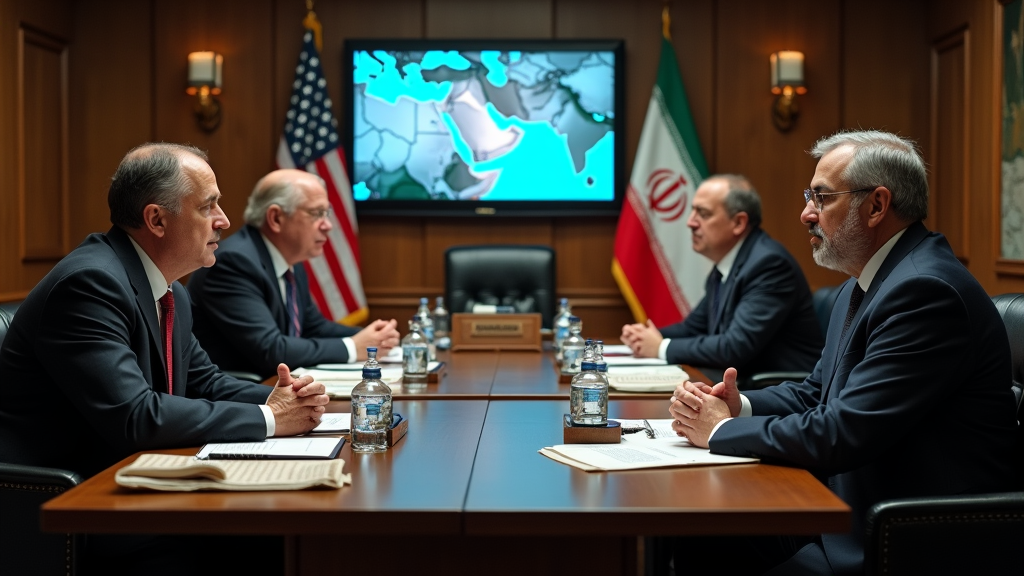Iran Resists Direct Talks Amid Trump’s Bombing Threats
Iran Rejects Direct Nuke Talks as Trump Threatens ‘Bombing’
The diplomatic landscape between the United States and Iran remains fraught with tension as President Donald Trump has made several public proclamations threatening military action if a nuclear deal cannot be reached. This scenario emerges amidst Iran’s firm stance against engaging in direct dialogue with the U.S., reflecting a prolonged history of mistrust exacerbated by the U.S.’s decision to withdraw from the Joint Comprehensive Plan of Action (JCPOA) in 2018. Instead, Iran is open to indirect negotiations facilitated through Oman, as articulated by President Masoud Pezeshkian.
Trump’s Explicit Military Threat
Central to this tense atmosphere is Trump’s stark warning that failure to agree to a new nuclear deal would result in military action against Iran. His rhetoric underscores a preference for diplomatic resolution, yet frames military intervention as the inevitable consequence of failed talks. Trump has repeatedly stated, “If they don’t make a deal, there will be bombing,” emphasizing the severe repercussions should Iran rebuff negotiations.
Iran’s Rejection of Direct Negotiations
Despite Trump’s explicit military threats, Iran has consistently rejected the prospect of engaging in direct talks with the United States, attributing this decision to distrust borne from previous breaches of international agreements by the U.S. Nevertheless, Iranian officials remain receptive to the idea of indirect dialogue through mediators such as Oman, seeking to navigate the complex political terrain without direct engagement.
Nuclear Timeline and Regional Escalation Risks
Analysts have expressed growing concern over the short timeline required for Iran to achieve nuclear weapon capability. Reports indicate that Iran could potentially produce a nuclear weapon within weeks, having enriched uranium to near weapons-grade levels. Both the U.S. and Iran have adopted assertive military postures, with strategic maneuvers including the deployment of U.S. B-2 bombers and revelations of Iranian missile bases, heightening the risk of regional escalation.
Historical Context of Failed Diplomacy
The erosion of trust between the U.S. and Iran is deeply rooted in historical diplomatic failures. Trump’s administration pursued a “maximum pressure” strategy characterized by stringent sanctions and military threats, a policy that has significantly undermined prospects for peaceful negotiation. Iran’s Supreme Leader has also historically denounced the efficacy of negotiations with the U.S., exacerbating the current stalemate.
Critical Quotes
Donald Trump: “If they don’t make a deal, there will be bombing. It will be bombing the likes of which they have never seen before.” He further elaborated, “My big preference is that we work it out with Iran, but if we don’t, bad, bad things are gonna happen.”
Masoud Pezeshkian (Iranian President): “We don’t avoid talks; it’s the breach of promises that has caused issues for us. They must prove they can build trust.”
Ali Shamkhani (Adviser to Iran’s Supreme Leader): Iran’s response to Trump’s letter was “restrained,” but Tehran is ready to “confront” threats if necessary.
Analysts’ Warnings: “Iran may be just weeks away from producing a deliverable nuclear weapon,” with a uranium stockpile sufficient for multiple bombs if further enriched.
Geopolitical Context
The geopolitical environment is further complicated by the collaborative stance of the U.S. and Israel. Israeli officials have publicly supported military options, while the strategic positioning of U.S. B-2 bombers in Diego Garcia signals readiness for potential action. Iran, on the other hand, has cited any attacks on its nuclear facilities as triggers for a broader conflict, threatening regional U.S. allies and assets.
Conclusion
The article’s claims are supported by credible sources and recent reports, capturing the precarious state of U.S.-Iran relations. With Trump’s ultimatum and Iran’s rejection of direct talks framing the discourse, the potential for escalation remains tangible. However, prospects for indirect negotiations through Oman provide a semblance of hope for diplomatic resolution amidst an environment of military readiness and diplomatic reticence.
latest video
news via inbox
Subscribe to the latest news in the world of politics and technology







